
In the first part of a new series Michael Fletcher & Helen Pugh roadtest technology at trial
- Technological advances are changing the way in which trials are conducted.
- Real-time transcription is particularly well-established and is an invaluable tool.
- E-bundles and the electronic presentation of evidence have the biggest potential.
It is impossible to ignore the impact of technology on modern life. The disruptive change which technology has brought to many industries such as the taxi and minicab industry has often occurred swiftly. So too the benefits to consumers: ten years ago, no lawyer could have arrived at court via Uber, because the company did not exist.
In contrast, the pace of technological change in the court room has been slow. The concept of ‘paperless trials’ has been around for many years, but they are (at best) rare at county court level. It is only in this decade that significant High Court trials have, sometimes, started to use electronic bundles. While the Rolls Building in London was opened









